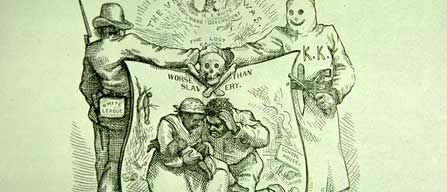The Fifth Amendment's reference to “due process” is only one of many promises of protection the Bill of Rights gives persons against the federal government. Originally these promises had no application at all against the states. In the middle of the Twentieth Century, about a century after its adoption, a series of Supreme Court decisions found that the Due Process Clause "incorporated" most of the important elements of the Bill of Rights and made them applicable to the states. (See: http://topics.law.cornell.edu/wex/due_process)
Judicial Review is the power of courts to interpret laws.
The Constitution does not expressly provide for judicial review. What should be made of this fact? Does it suggest that the framers did not intend to give the courts such a power? Not necessarily, although that is one explanation for its absence. It is also possible that the framers thought the power of judicial review was sufficiently clear from the structure of government that it need not be expressly stated. A third possibility is that the framers didn't think that the issue would ever come up, because Congress would never pass legislation outside of its enumerated powers.
John Marshall is the Chief Justice who established the Supreme Court's power of judicial review
The Civil War 1861-1865
Deserted Camp and Wounded Soldier
The antebellum era--the period from the War of 1812 to the Civil War--was an era of political democratization, unprecedented reform energies, and explosive territorial and economic growth. But it also saw the emergence of bitter sectionalism and political conflicts, and the North and South developed along diverging lines. The great question haunting the period was whether the spirit of sectionalism or the spirit of nationalism would triumph.
The Civil War, America's bloodiest conflict, cost nearly 1,100,000 casualties and claimed more than 620,000 lives. The campaigning armies left destruction in their wake, particularly in the Southern states that bore the brunt of the fighting. Best estimates place the total number of war-time clashes in excess of 10,000, many of them large scale encounters that resulted in staggering losses for both sides.
Reconstruction 1865-1877
 Armed White Man's Leaguer and Ku Klux Klan
Member Shake Hands a cowed African, by Thomas Nast, printed in American
Family (October 1874)
Armed White Man's Leaguer and Ku Klux Klan
Member Shake Hands a cowed African, by Thomas Nast, printed in American
Family (October 1874)
Historian Eric Foner has called Reconstruction a "a splendid failure." It did not succeed in resolving the debate over the meaning of freedom in American life. Yet, among the societies that abolished slavery in the 19th century, the U.S., for a moment offered the ex-slaves a measure of control over their own destinies.
The Reconstruction Amendments, and especially the Fourteenth, transformed the Constitution from a document primarily concerned with federal-state relations and the rights of property into a vehicle through which members of vulnerable minorities could stake a claim to substantive freedom and seek protection against misconduct by all levels of government. The rewriting of the Constitution promoted a sense of the document’s malleability, and suggested that the rights of individual citizens were intimately connected to federal power. The Bill of Rights had linked civil liberties and the autonomy of the states. Its language -- "Congress shall make no law" -- reflected the belief that concentrated power was a threat to freedom. Now, rather than a threat to liberty, the federal government, declared Charles Sumner, the abolitionist Senator from Massachusetts, had become “the custodian of freedom.” The Reconstruction Amendments assumed that rights required political power to enforce them. They not only authorized the federal government to override state actions that deprived citizens of equality, but each ended with a clause empowering Congress to "enforce" them with "appropriate legislation." (See: http://www.gilderlehrman.org/historynow/12_2004/historian.php)
equal protection of law
The Equal Protection Clause of the 14th amendment of the U.S. Constitution prohibits states from denying any person within its jurisdiction the equal protection of the laws. In other words, the laws of a state must treat an individual in the same manner as others in similar conditions and circumstances. A violation would occur, for example, if a state prohibited an individual from entering into an employment contract because he or she was a member of a particular race. The equal protection clause is not intended to provide "equality" among individuals or classes but only "equal application" of the laws. By denying states the ability to discriminate, the equal protection clause of the Constitution is crucial to the protection of civil rights.
(See: http://topics.law.cornell.edu/wex/Equal_protection)
Readings:
- Portrait of America, Vol. I: essays #14, #26, #30
- The Bill of Rights
- John Marshall's cases: a synopsis of

